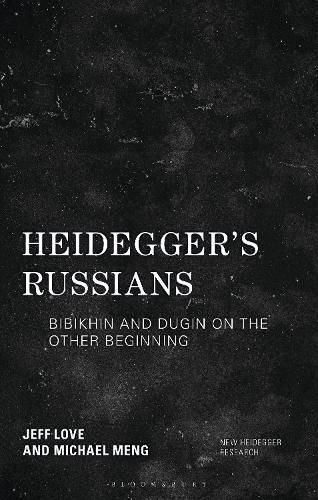Readings Newsletter
Become a Readings Member to make your shopping experience even easier.
Sign in or sign up for free!
You’re not far away from qualifying for FREE standard shipping within Australia
You’ve qualified for FREE standard shipping within Australia
The cart is loading…






This book gives a philosophical account of Martin Heidegger's influence on two important and hitherto understudied Russian philosophers, Aleksandr Dugin (b. 1962 -) and Vladimir Bibikhin (1938 - 2004). The book focuses on Heidegger's thought as revolutionary and in search of bringing about an other beginning in philosophy and politics. Dugin and Bibikhin are examples of Russian thinkers inspired by Heidegger to consider revolutionary alternatives in the creation of a new beginning for Russia in the wake of the collapse of the Soviet Union in 1991. Dugin represents an attempt to assert the sovereign identity and destiny of Russia and Russian thought as against modern liberal thinking, inspired by the Enlightenment and embodied in the hegemony of the United States, the "unipolar tyrant" threatening to impose its domination on the world. Bibikhin envisages a different assertion of Russian identity that does not seek direct confrontation with other nations but a transformation in how we may think the political and the destiny of humanity in the modern technological age. If Dugin advocates struggle and a philosophy of chaos that is distinctively Russian in his view, Bibikhin advocates a coming to terms with our brief existence by taking on the burden of mortality, in his words, the "burden of the cross." If Dugin advocates recognition of the negative and nothingness, Bibikhin advocates plenitude, a fullness that cannot be exhausted. These Russian thinkers take up major aspects of Heidegger's philosophical work; they adapt them in intriguing ways to an extreme existential and political situation whose consequences are still very relevant to the present day, both in terms of Russia's influence on the world stage and on the growing turn to the political right that is an international phenomenon of considerable importance.
$9.00 standard shipping within Australia
FREE standard shipping within Australia for orders over $100.00
Express & International shipping calculated at checkout
Stock availability can be subject to change without notice. We recommend calling the shop or contacting our online team to check availability of low stock items. Please see our Shopping Online page for more details.
This book gives a philosophical account of Martin Heidegger's influence on two important and hitherto understudied Russian philosophers, Aleksandr Dugin (b. 1962 -) and Vladimir Bibikhin (1938 - 2004). The book focuses on Heidegger's thought as revolutionary and in search of bringing about an other beginning in philosophy and politics. Dugin and Bibikhin are examples of Russian thinkers inspired by Heidegger to consider revolutionary alternatives in the creation of a new beginning for Russia in the wake of the collapse of the Soviet Union in 1991. Dugin represents an attempt to assert the sovereign identity and destiny of Russia and Russian thought as against modern liberal thinking, inspired by the Enlightenment and embodied in the hegemony of the United States, the "unipolar tyrant" threatening to impose its domination on the world. Bibikhin envisages a different assertion of Russian identity that does not seek direct confrontation with other nations but a transformation in how we may think the political and the destiny of humanity in the modern technological age. If Dugin advocates struggle and a philosophy of chaos that is distinctively Russian in his view, Bibikhin advocates a coming to terms with our brief existence by taking on the burden of mortality, in his words, the "burden of the cross." If Dugin advocates recognition of the negative and nothingness, Bibikhin advocates plenitude, a fullness that cannot be exhausted. These Russian thinkers take up major aspects of Heidegger's philosophical work; they adapt them in intriguing ways to an extreme existential and political situation whose consequences are still very relevant to the present day, both in terms of Russia's influence on the world stage and on the growing turn to the political right that is an international phenomenon of considerable importance.